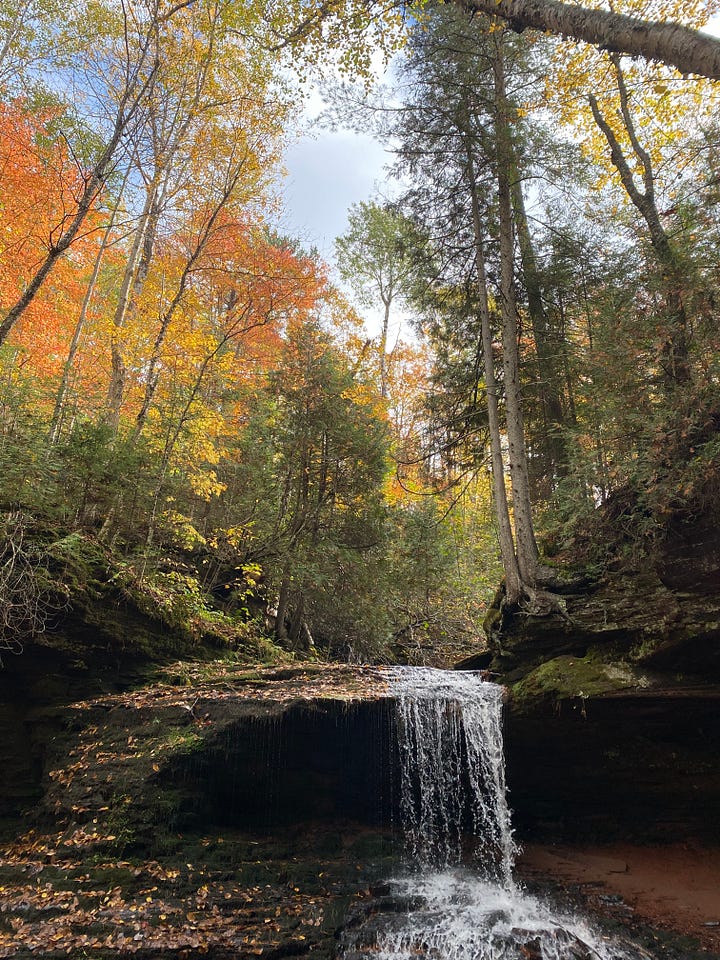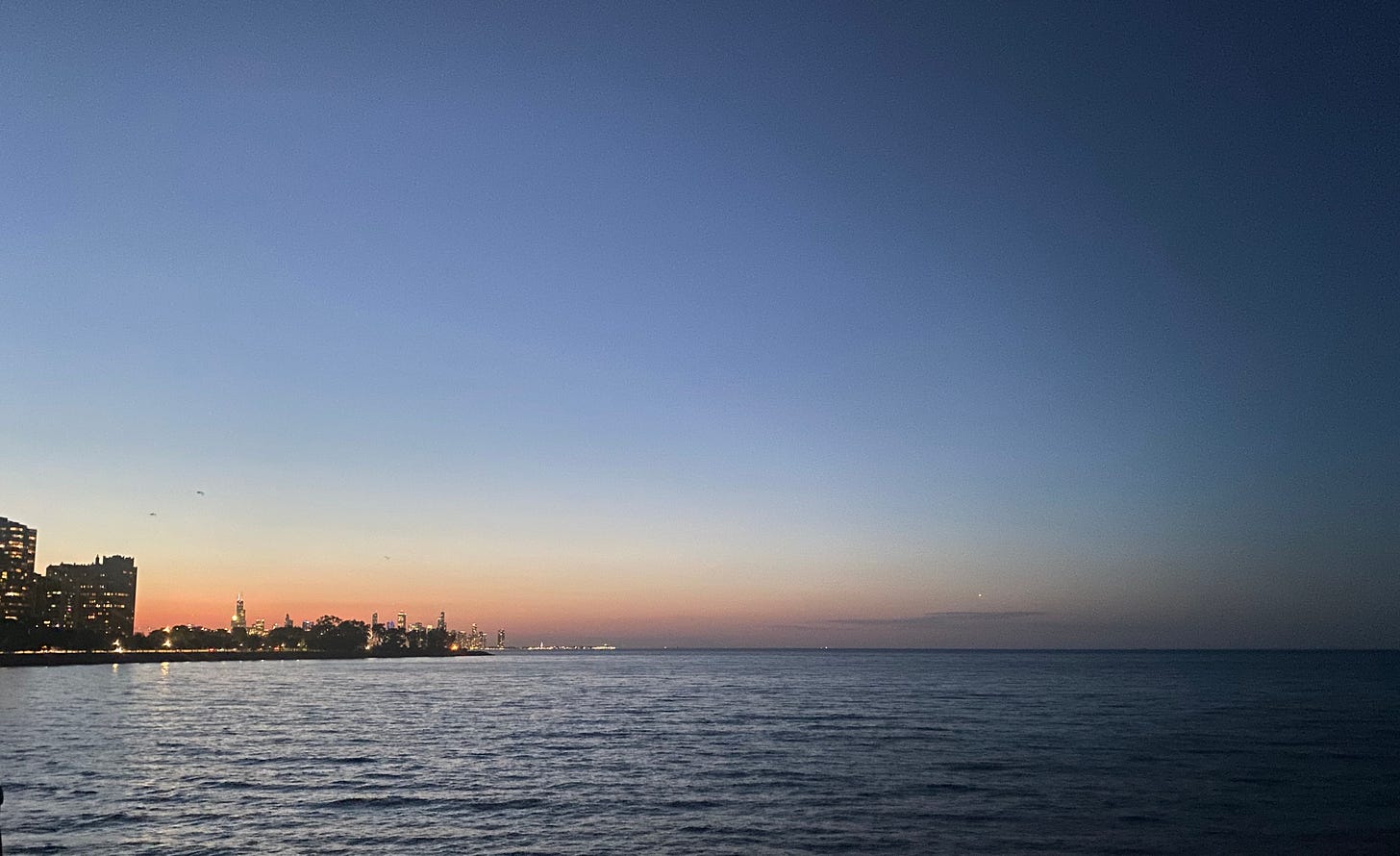Dear friend,
Earlier this month, I decided to spend a few hours working at a coffee shop in a different neighborhood. When I parked my car and stepped out onto the street I felt something move through me like a tickle or a shiver. A memory arose: almost three years ago, I’d walked down that same street on a chilly fall night brushing shoulders with a guy I really liked. At the end of a good second date, we walked from a nearby bar back to his apartment. I remember the local businesses he pointed out, the small anecdotes he shared about his neighborhood and the anticipation that lived in the pace of our steps.
I left the coffee shop after a few hours on my laptop and felt compelled to walk that same path a few blocks up. I kept looking for a short alley gate — the kind that leads to a back house. Years ago, I’d awkwardly climbed over one of those gate in my favorite brown corduroy skirt, too nervous to ask him to unlock the gate from the inside when I left late that night. I cringe at the thought of myself, walking back to my car alone for four or five blocks at 1am in an unfamiliar neighborhood . . . how deeply I wanted that night to be the beginning of something magical and how deeply I believed the key to that magic was making my needs, already small, invisible.
On that street, there are a dozen houses with alley doors just like the one I climbed over. Instead of trying to search the archives of my mind for a detail faded by time, I stood on the quiet sidewalk, took a deep breath and listened.
When the fling I had imagined was the beginning of a fairytale fell apart almost immediately, I was devastated. I could not reconcile the story I had already built out in my mind with reality. Having just returned from a five month roadtrip and still in the midst of a pandemic, I was grasping (clawing?) for something (or someone) to anchor myself in. I had bottled up all of my hopes and placed them in the hands of a stranger expecting him to know how to handle them with care. Expecting him to want them at all. This was how it happened in the movies, right? Someone comes along and recuses you from the thorny, gutting work of figuring it all out.
In him I’d seen an artist, someone who was well-educated, entrepreneurial, embedded in loving community; the kind of person who went to the farmer’s market regularly and was invited to bonfires by the Lake. A person with burgeoning curiosity about ancestry, indigeneity and spirituality. I saw the person I wanted to be and hoped this would be a shortcut to getting there.
In Kaveh Akbar’s poem “The Miracle” he writers, “Imagine the emptiness in you, the vast cavities you have spent your life trying to fill—with fathers, mothers, lovers, language, drugs, money, art, praise—and imagine them gone. What's left? Whatever you aren't, which is what makes you . . .”
I felt shame bloom and rot in those crevices as I was continually confronted by my own willingness to disregard myself; the way I spend months (years?) hoping the parts of myself I’d abandoned would be miraculously redeemed — that some other savior or shortcut was coming on the near horizon. I remember referring to that season as the “season of rejection” — what I now think of as the season of removal. With each spiritual or psychological cavity I tried to fill with something or someone, I was returned again and again and again to the void. I was called again to heal. To learn the contours of those hollows. To let God fill the abyss in slow and mysterious ways.
That autumn back in 2021, I found myself swallowed up by lack. I watched two of my closest friends in the city relocate to the east coast. I found myself unexpectedly alone in a three bedroom apartment with barely enough furniture to fill a studio. The guy I’d decided would catapult me past all of this uncertainty opted out.
The weekend trip I had planned to visit a friend’s family cabin in rural Wisconsin came at the perfect time. On an overcast morning, we parsed out a small bundle of magic mushrooms between the three of us and waited. As the day unfolded, light thunderstorms moved in and around the area. The sky seemed to crack open with a kaleidoscope of lighting. Each raindrop moved in slow motion as it fell to my face. We saw rainbows.


In Ingrid Rojas Contreras’ memoir, The Man Who Could Move Clouds, she recounts the process of losing and regaining her memory after a biking accident. She talks about her evolved relationship to shame, writing: “As memory returned, though I could recall the shape and weight of this shame, the sting of it was gone. I lost the impulse to hide . . .” Later in the book, she describes the sensation in more detail: “I only knew the things my body told me: that there had been a before—a place where I had borne some unidentifiable weight on my shoulders and against my chest—and that there was a now—a dizzying unbounded place where I had laid my burdens down.”
When I drove away from the cabin the following day, I did not feel as though shame had left me or that I’d laid down my burdens. But I did feel a shift. I’d encountered a part of myself and a way of experiencing the world that I never had before. I’d crawled into the craters of myself and found that there was a bottom to that darkness. I found that it’s hallowed out shape was made of smooth, glistening stone and in the emptiness there was a silence, holier and more expansive than I could have imagined.
Over the last few years, I’ve returned to that intense season of removal, loss, and emptiness with newfound tenderness. I’ve thought a lot about that version of myself and all the lessons she’s learned since then (and keeps having to learn again and again). I’ve revisited that night to walk with the younger version of myself through dimly lit streets. I can see her willfulness and her exhaustion — the longing in her fragile heart. I’ve looked at her in all of her anxious, shaky longing and told her gently what took years me to understand: nothing outside of herself would be the key to healing or freedom.
Last week a friend and I met up by Lake Michigan. As we talked deep into the evening, I smiled feeling the vibrancy of my life wrapped around me: a life full of art, writing, friendship and belonging. I was the person who got invited to bonfires and visited the farmer’s market on weekends. It was my own relationship to ancestry and spiritual practice that awed me. No part of me could imagine a reality in which I’d willingly climb over a gate (unless in pursuit of something mischievous or deliciously delinquent).
All of my hopes and dreams were placed back where they belonged: in the empty crevices of myself. My own precious treasures.
Watching the sunset transform, I thought about the kaleidoscopic sky from Wisconsin and finally felt what had only begun to feel possible then: the sting of shame gone; the dizzying lightness of more burdens lifted.
With love,
Jas









